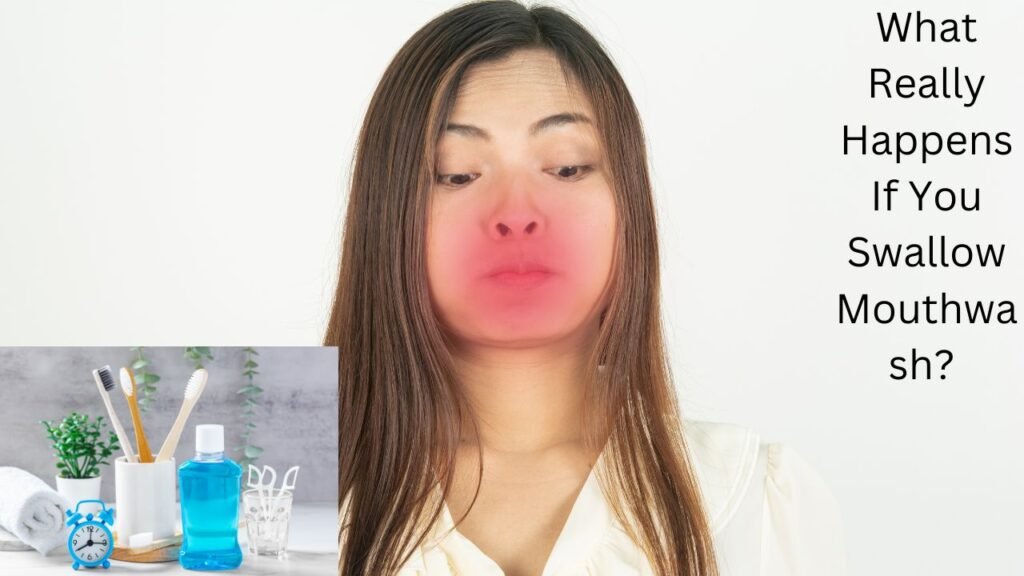Swallowing mouthwash can be more than just a surprise; it can prompt real concerns about health. Whether it’s a small accidental gulp or a more significant ingestion, understanding the effects and proper responses can alleviate worries.
Let’s dive deep into what happens if you swallow mouthwash, breaking it down into clear, informative sections.
What Is Mouthwash and What Does It Do?

Mouthwash, or oral rinse, is a liquid product used to enhance oral hygiene. It’s commonly used to:
- Freshen Breath: Eliminate bad odors and leave your mouth feeling clean.
- Reduce Plaque: Prevent plaque buildup and manage gingivitis.
- Fight Bacteria: Kill bacteria that contribute to gum disease and tooth decay.
Different mouthwashes contain varying ingredients designed to address these goals. However, swallowing even a small amount can have different effects depending on its formulation.
Understanding Mouthwash Ingredients
To understand the effects of swallowing mouthwash, it’s crucial to know its common ingredients:
- Alcohol: Often found in many mouthwashes, it acts as an antiseptic. Typical concentrations range from 10% to 27%. High alcohol content can irritate the gastrointestinal tract and lead to nausea or vomiting.
- Fluoride: Added to strengthen enamel and prevent cavities. Mouthwashes usually contain between 0.05% and 0.1% fluoride. Excessive ingestion can cause fluoride toxicity, which may manifest as gastrointestinal discomfort or, in severe cases, fluoride poisoning.
- Peroxide: Known for its whitening and antibacterial properties. Peroxide concentrations are usually between 1% and 3%. Swallowing large amounts can lead to stomach upset and potential irritation.
- Essential Oils: Ingredients like eucalyptol, menthol, and thymol are used for their antibacterial properties and refreshing taste. They can cause allergic reactions or digestive issues if ingested in significant amounts.
- Sweeteners and Colorants: Added for flavor and appearance, sweeteners such as sorbitol and saccharin are generally safe in small amounts but can cause mild gastrointestinal symptoms or allergic reactions in sensitive individuals.
Immediate Effects of Swallowing Mouthwash
Swallowing mouthwash, whether a small sip or a large gulp, can result in various symptoms. Here’s what you might experience:
- Nausea and Vomiting: Alcohol and strong flavors can irritate the stomach lining, leading to nausea and vomiting. This is particularly likely if a substantial amount is ingested.
- Stomach Upset: Abdominal pain, cramping, and diarrhea can occur due to the irritation from ingredients like alcohol and fluoride.
- Dizziness and Headaches: High concentrations of alcohol can affect your balance and cause dizziness or headaches.
- Dry Mouth and Throat Irritation: Some mouthwashes can dry out the mouth and cause a sore throat.
- Allergic Reactions: In rare cases, the essential oils or other ingredients may trigger allergic reactions, resulting in rash, itching, or swelling.
Sensitivity Matters: Individual responses vary. Some people may experience more severe symptoms based on their overall health and sensitivity to mouthwash ingredients.
Long-Term Effects of Chronic Mouthwash Ingestion
Swallowing mouthwash occasionally is unlikely to cause long-term issues, but chronic ingestion or misuse can lead to:
- Fluoride Toxicity: Excessive fluoride intake can result in dental or skeletal fluorosis, causing symptoms like tooth discoloration and joint pain.
- Digestive Problems: Long-term irritation from high levels of alcohol or peroxide may lead to chronic digestive issues.
- Medication Interactions: Alcohol in mouthwash may interact with certain medications, reducing their effectiveness or causing adverse reactions.
Regular Check-ups: It’s essential to visit your dentist regularly to monitor for any potential issues related to mouthwash use and overall oral health.
Preventive Measures:
- Dilute Mouthwash: Using it in diluted form or less frequently can minimize risks.
- Consult Your Dentist: Seek professional advice to address any concerns about mouthwash use.
What to Do If You Swallow Mouthwash
If you or someone else swallows mouthwash, here’s what you should do:
- Drink Water: Rinse the mouth with water and drink a few glasses to dilute the mouthwash in the stomach.
- Avoid Inducing Vomiting: Do not attempt to induce vomiting, as this could cause additional harm or irritation.
- Contact Poison Control: For guidance, contact a local poison control center or seek medical attention if significant amounts were swallowed or symptoms are severe.
- Seek Medical Help: If experiencing severe symptoms like difficulty breathing or persistent pain, seek immediate medical attention.
- Stay Calm: Most cases of accidental mouthwash ingestion do not result in severe outcomes, but it’s crucial to act cautiously and follow these steps.
Preventing Accidental Ingestion
Here are some tips to help avoid swallowing mouthwash:
- Store Safely: Keep mouthwash out of reach of children and pets. Use child-resistant caps and secure storage locations.
- Use Responsibly: Follow the recommended usage instructions and avoid leaving mouthwash unattended.
- Educate: Teach children and teens about the proper use of mouthwash and the importance of not swallowing it.
Additional Tips:
- Read Labels: Always check the mouthwash label for specific usage instructions and warnings.
- Alternative Oral Care: Consider using natural mouthwash alternatives or reducing reliance on commercial mouthwashes.
Conclusion
Swallowing mouthwash can cause a range of immediate symptoms, from mild nausea to more severe reactions, depending on the amount and type ingested. While occasional ingestion is unlikely to lead to long-term issues, chronic or significant ingestion can have health implications. By understanding the ingredients, knowing how to respond, and taking preventive measures, you can manage and reduce the risks associated with mouthwash ingestion.
For more information on oral health and prevention tips, subscribe to our blog and stay updated with the latest advice. If you have concerns or need personalized guidance, consult your dentist to ensure your oral care routine is safe and effective.
Find Your Perfect Dentist
Easily book appointments with top-rated dentists in your area
Need Emergency Dental Care?
Get immediate help from verified dental professionals